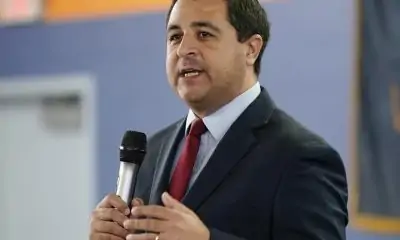When I was an undergraduate at Yale, in the early nineteen-nineties, I went to the university’s gymnasium one evening each week for a women’s self-defense class. We were instructed on how to fight off would-be rapists with physical force, using our knees, elbows, fingernails, and keys, being sure to mark an attacker’s face for police identification. Walking to my dorm in the dark, I was alert to not being a victim. It was part of the informal feminist curriculum that also included Take Back the Night marches and the slogan “No Means No,” one that dates me to an era when women were trying to defy vulnerability.
As a rape counsellor in those days, I remember chuckling with feminist peers when we heard about a new Sexual Offense Prevention Policy at Antioch College. The rules said that consent had to be asked for and given at each new level of sexual activity, with silence conveying a lack of consent. Saturday Night Live mocked the policy: “May I elevate the level of sexual intimacy by feeling your buttocks?” “Yes, you have my permission.” This stilted picture of how sex should proceed seemed absurdly unrealistic and made a small college’s policy a national punch line, despite its serious and understandable aim to prevent rape. At the time, even the category of “date rape,” on which I was trained to educate others, mostly envisioned a forcible act or one imposed on an incapacitated person.
But, three decades later, Antioch’s vision has more than stood the test of time, as evidenced by many young people and their schools’ views about how sexual interactions should be governed. The aspiration of affirmative consent is no joke; it is now mainstream and considered common sense among college students and recent graduates. So, in a typical example, today, Yale’s standard is one of affirmative consent, which it defines as “positive, unambiguous, and voluntary agreement to engage in specific sexual activity throughout a sexual encounter.” The policy goes on: “Consent cannot be inferred merely from the absence of a ‘no.’ A clear ‘yes,’ verbal or otherwise, is necessary. Consent to some sexual acts does not constitute consent to others, nor does past consent to a given act constitute present or future consent. Consent must be ongoing throughout a sexual encounter and can be revoked by any participant at any time.” Whether or not it is actually honored in the breach, affirmative consent is now used for purposes of investigations and penalties.
I’ve seen what enforcement of these standards looks like, as a lawyer representing students complaining of or accused of sexual misconduct. Today, schools that have affirmative-consent policies treat violations as sexual assault. In hundreds of cases, colleges have determined that men and women failed to obtain affirmative consent in a particular instance and have disciplined them, often with suspension or expulsion. In many other cases, students have felt deeply violated even when their partner followed affirmative-consent rules—asking for and receiving a “yes”—because aspects of the situation made them feel that what occurred was not what they wanted. Sometimes the explicit request for permission might have induced them to do something they were conflicted about. Some schools have trained students, as part of orientation, to seek and settle for nothing less than “enthusiastic” agreement to sex. Even under an affirmative-consent regime’s valorization of clarity, “yes” doesn’t always mean “yes.”
The jury is still out on whether our experiment with affirmative consent will reduce rape, prove useful for distinguishing sex from sexual assault, or lead to less experience of sexual violation. But what may well emerge is a recognition that the clearest practices of “yes” and “no” do little to untangle a deep difficulty that makes consent seem promising yet wide of the mark: the altogether human experience of not knowing in the first place what is wanted or unwanted, desired or undesired.
In a letter to Princess Marie Bonaparte, a French psychoanalyst who sought treatment for what she described as “frigidity,” Sigmund Freud wrote, in the nineteen-twenties, “The great question that has never been answered, and which I have not yet been able to answer, despite my thirty years of research into the feminine soul, is ‘What does a woman want?’ ” This unanswerable question seems to drive Katherine Angel’s “Tomorrow Sex Will Be Good Again: Women and Desire in the Age of Consent” (Verso), which welcomes us to experience a twenty-first-century feminist version of Freud’s aporia. We might have supposed that the sexual revolution of the nineteen-sixties and seventies would have liberated women and men to say what it is that they want and to get those wants satisfied. But Angel—whose book takes its title from Michel Foucault’s sardonic declaration, in the 1976 book “The Will to Knowledge,” that, in the wake of the emancipatory movements of the day, “Tomorrow sex will be good again”—deflates any delusions that the goodness of sex hinges on positive affirmation of our true desires. Foucault wrote, “We must not think that by saying yes to sex one says no to power.” Speaking truth to power simply doesn’t cut it, because the truth about our desires is . . . ambivalence, all the way down. The dominant socio-legal rubric that purports to divide permitted acts from prohibited ones—consent—is an on-off switch, not a dimmer. That doesn’t accommodate what, to Angel, is at the heart of desire and pleasure: the mixed feelings, the indeterminacy, the pulling in different directions, the balancing of conflicting considerations, the imbalanced negotiations, the paralysis by uncertainty. All of it is universal, she suggests, and also particular to “the double bind in which women exist: that saying no may be difficult, but so too is saying yes.”
Angel is the author of two previous books on female sexuality, “Unmastered: A Book on Desire, Most Difficult to Tell,” from 2012, an aphoristic work crossing memoir, prose poetry, and philosophy, and “Daddy Issues,” from 2019, a long essay on the father-daughter dynamic. In “Unmastered,” Angel evinces skepticism about words as an adequate medium for conveying desire: “When the doing is dominated by speaking, when there are too many words words words, it is because, in fact, you are somehow not enough. By which I mean that you do not feel yourself to be enough, and that feeling makes you shrink, in your eyes and mine.” Yet in what Angel calls “consent culture,” preventing sexual violence and insuring sexual pleasure rest on a woman expressing what she wants. “Woe betide she who does not know herself and speak that knowledge,” she writes in her new book. This vision dovetails with what Angel terms “confidence feminism,” in which self-respecting women are supposed to be outspoken and assertive, so as to claim their equality and empowerment. (Cue Sheryl Sandberg’s “Lean In” or Amy Cuddy’s TED Talk on “power poses.”) In sex, this mode translates into the consent solution: a (strong) woman speaks to get the sex that she wants. If she doesn’t speak up, she risks assault, but there is also such a thing as bad sex, which we tend to see as an inevitable life experience, not rape. This is where Angel wants to intervene, refusing to brush aside bad sex just because it may be consensual and not legally punishable. “ ‘Bad sex’ doesn’t have to be assault in order for it to be frightening, shame-inducing, upsetting, and a legal concept has trouble drawing out this difference,” Angel writes. “Bad sex is a political issue, one of inequality of access to pleasure and self-determination, and it is as a political issue that we should be examining it.” Angel is with critics of consent culture in observing that affirmative-consent rules blur the distinction between sexual assault and bad sex, but she diverges from them in her view that bad sex is also a serious political, if not legal, problem, worthy of our attention.
“Bad sex,” Angel writes, is “miserable, unpleasant, humiliating, one-sided, painful” sex. Much consensual—even affirmatively consented to—sex is still bad sex. And, when affirmative-consent standards are adhered to, bad sex may become even worse; a woman might judge herself for a gap between what she says and what she feels, or for not having more clear-cut desires. The pains of sexual life are unfairly distributed: sex for a woman can involve the risks of pregnancy; slut-shaming; judgment, of her assertiveness or her diffidence; blame, for wanting it or not wanting it. Studies show a significant pleasure gap between men and women. What should we do about women who are experiencing what Angel calls “so much misery-making sex”? Since consent can’t distinguish effectively between good and bad sex, Angel proposes, we need to shift focus. The solution is to acknowledge “the fact of women’s vulnerability to violence” but stop trying to “make them invulnerable in response.” The hardening project of my college self-defense class and today’s earnest affirmative-consent push would be twin failures in that regard. Instead, Angel writes, we should acknowledge that “we don’t always know what we want,” in order “to allow for obscurity, for opacity and for not-knowing.” All those hours in therapy, working on knowing ourselves, only to see that “self-knowledge is not a reliable feature of female sexuality, nor of sexuality in general; in fact, it is not a reliable feature of being a person.”





















